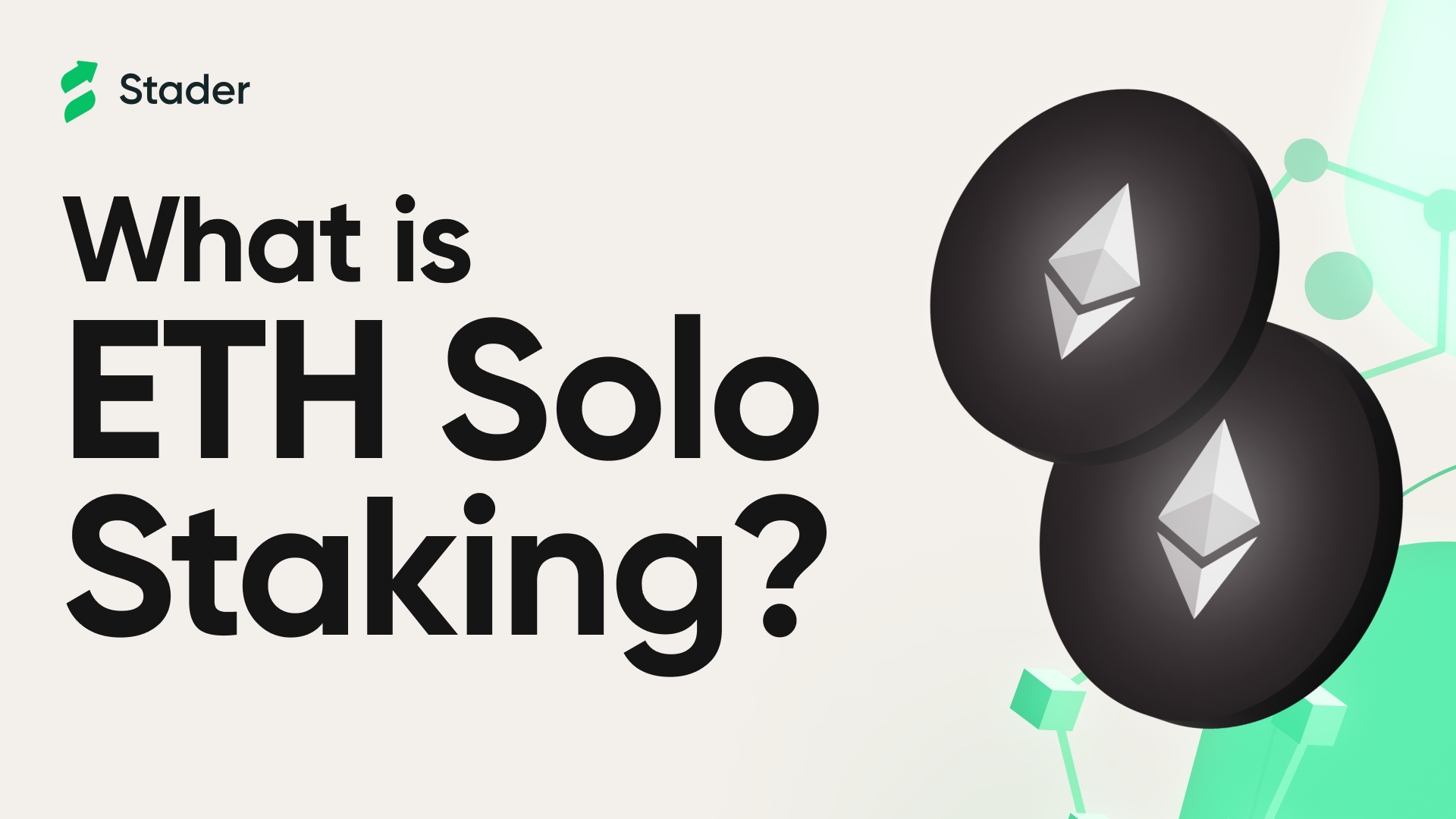What is Eth Solo Staking?

Solo Ethereum staking is the process of running your own Ethereum validator node and depositing 32 ETH to help secure the Ethereum network. As a reward of staking your tokens, you earn ETH staking rewards.
Why Stake Eth Solo?
There are several reasons why you can consider to stake Eth solo:
- Higher rewards: Solo stakers earn the full staking rewards, while pooled stakers typically have to give to a fee to the staking pool operator.
- More control: Solo stakers have full control over their staking node, including the hardware it runs on, the Executions and Consensus clients it uses, and other features like the MEV relay
- Support the network: Solo stakers are directly helping to secure the Ethereum network by running their own validators.
Also Read: Ethereum Merge
What to Consider before Solo Staking your Eth
There are a few things you should consider before staking Eth solo:
- Hardware requirements: Solo stakers need to have a dedicated computer with at least a 4-core CPU, 16 GB RAM, at least 2 TB SSD and a reliable internet connection.
- Technical expertise: Solo staking requires a certain level of technical expertise to set up and maintain a validator node.
- Risks: Solo stakers face all of the same risks as pooled stakers, such as the risk of slashing if their validator goes offline or votes on an invalid block.
Also Read: Total Value Locked
How Eth Solo Staking Works?
To stake Eth solo, you will need to:
Set up a validator node. This involves installing the Ethereum software and configuring it to run as a validator.
Deposit 32 ETH to your validator node.
Wait for your validator node to be activated. This can take up to 24 hours.
Wait in the Beacon Chain validator queue until your validator get deposited and activated in the Beacon Chain.
Once your validator node is active, you will start earning staking rewards.
Also Read: Cross-Chain Bridges
Solo Eth Staking Requirements
To stake Eth solo, you will need:
- A dedicated computer with at least a 4-core CPU, 16 GB RAM, at least 2TB SDD, and a reliable internet connection.
- 32 ETH.
- The Ethereum software.
Also Read: Best Ethereum Wallets
Advantages of Solo Eth Solo Staking
The advantages of solo Eth staking include:
- Higher rewards
- More control
- Supporting the network
Risks Involved in Solo Eth Staking
The risks involved in solo Eth staking include:
- Hardware requirements
- Technical expertise
- Risks of slashing
Conclusion
Solo Eth staking is a good option for users who want to earn the full staking rewards and have more control over their stake. However, it is important to be aware of the hardware requirements, technical expertise required, and risks involved.
Also Read: How to Become a node operator on ETH
FAQ’s
Q) What is the minimum ETH required to stake solo?
Ans) The minimum ETH required to stake solo is 32 ETH.
Q) What are the hardware requirements for solo staking?
Ans) Solo stakers need to have a dedicated computer with at least a 4-core CPU, 16 GB RAM, 2 TB SSD and a reliable internet connection. The Ethereum software recommends using a computer with at least 8 GB of RAM and 1 TB SSD of storage space.
Q) What is the risk of slashing?
Ans) Slashing is a penalty that is imposed on validators who go offline or vote on an invalid block. Slashing can result in the loss of some or all of the staked ETH.
Q) Is solo staking more profitable than pooled staking?
Ans) Solo staking can be more profitable than pooled staking, but it is important to factor in the cost of running your own validator node. Solo stakers also need to be aware of the risk of slashing.
Q) Is solo staking right for me?
Ans) Solo staking is a good option for users who want to earn the full staking rewards and have more control over their stake. However, it is important to be aware of the hardware requirements, technical expertise required, and risks involved.
Popular Searches
Eth2 Staking | Ethereum Merge | Ethereum Upgrade | Ethereum Staking Rewards | Ethx Vs Solo-Staking | Ethereum Gas | What Is Ethereum | Decentralisation In Ethx | Eth Node Operator | What is Dex | ERC-6551 | Ethereum Virtual Machine | How To Check Your Eth Transactions | ERC-20 | Polygon Vs Eth | Components Of Ethereum Network | Ethereum Layer 2 | Ethereum Security | Benefits Of Ethereum Staking | Bnb Staking